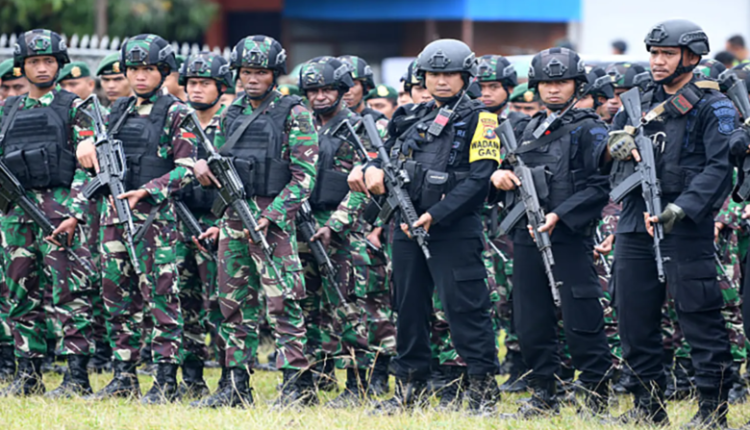Appreciating the steps taken by the security forces to take firm action against the OPM group
The Indonesian government has taken firm steps in Papua, an area that is often in the spotlight due to acts of separatism. This decision is a response to the efforts of the Free Papua Organization (OPM) which continues to strive for Papuan independence. Indonesia, as a country that is firm in its principles of unity and territorial integrity, has faced this problem seriously.
The firm steps taken by the government to respond to OPM have broad implications, both at the national and international levels. At the national level, this action can affect internal political dynamics, security and stability in Papua.
Firm steps to reject the existence of the OPM and mobilize special elite troops to eradicate the movement. Elite special forces have been deployed to tackle this threat, marking a new chapter in the political and security dynamics in the region.
The Indonesian government’s decision to reject the existence of the OPM and send the elite TNI Orange Beret Troops to eradicate this group is an effort to restore security and stability in Papua. Commander of Commando Wing I, Kopasgat Colonel Pas Helmi A. Nange said the elite Orange Beret troops would strengthen border defenses in Papua as well as anticipate attacks.
Apart from that, his party has sent 400 troops to serve there. 400 Kopasgat personnel will be assigned to 13 to 15 designated posts. Not only that, the personnel will also guard all airports in areas prone to OPM terrorist attacks. However, Helmi did not explain in detail how many airports his troops would focus on guarding.
Support for the government’s firm steps cannot be ignored either. Many people feel that the OPM has been disrupting order and stability in Papua for years, and that tough action is needed to address this threat.
Apart from that, this government decision is also a form of firmness in upholding state sovereignty and enforcing the law in areas that are often areas of conflict. The hope is that the steps taken by the Indonesian government can bring positive results and lead Papua towards a better future.
The OPM launched several attacks in the Homeyo District area, Intan Jaya Regency, the Afrianus Bagubau and Keny Tipagau groups again attempted to attack the Joint Security Forces (Apkam) that were securing the Homeyo District. The Joint Apkam, which is on guard in the Homeyo District area, continues to take proactive steps to protect the local area from OPM interference.
The Joint Apkam involved the Habema TNI Operations Command (Koops TNI) unit and the Nanggala Kopassus Task Force. Before contact took place, Joint Apkam troops who were in the area at the eastern end of Pogapa Airport were conducting area checks. When the patrol found indications of the presence of OPM around the patrol area and carried out a chase followed by gunfire. At the end of the pursuit phase, the results were found in the form of arrows and bows, flashlights, several photos of OPM, a non-permanent shelter built by OPM along with an OPM observation post which was used to scout the condition of the Homeyo area and its surroundings.
Joint TNI-Polri troops, the Nanggala Kopassus Task Force, succeeded in seizing the Homeyo District in Intan Jaya Regency, Papua, which was previously occupied by the OPM. TNI Brigadier General Lucky Avianto, who currently serves as Commander of Korem 172/Praja Wira Yaksa, successfully led a lightning operation for 20 minutes.
Commander of Kogabwilhan III, Lt. Gen. TNI Richard TH Tampubolon said the evacuation operation from the Homeyo District area was a humanitarian activity to create a conducive regional security situation to support all processes of accelerating Papua’s development. Nanggala Kopassus Task Force troops moved quickly to reclaim the Homeyo District from the hands of the OPM group.
To achieve this goal, it is important for the government not only to focus on a military approach, but also to pay attention to efforts at reconciliation, development and community empowerment. The conflict in Papua will never be resolved permanently through violence or repression alone. Rather, long-term solutions require a commitment to creating space for dialogue, easing tensions, and addressing the root causes of conflict.
Even though the situation is complex, efforts to achieve peace and resolve the conflict in Papua continue. The Indonesian government has expressed its commitment to improving the situation in Papua through various initiatives, including dialogue with separatist groups, economic empowerment, and infrastructure improvements. However, major challenges remain, especially in building trust between the central government and the Papuan population.
Apart from that, mediation efforts and assistance from the international community can also play an important role in promoting peace in Papua. International organizations and partner countries can provide political, diplomatic and financial support to facilitate dialogue between the government and Papuan separatist groups.
The community and students certainly have a role in fighting for peace and justice, as well as supporting reconciliation and development efforts in Papua. By building awareness and mobilizing public support, youth can become agents of positive change in realizing sustainable peace in Papua.
